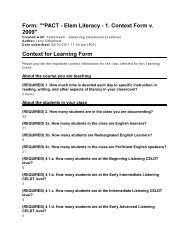The Tutoring Book - California State University, Sacramento
The Tutoring Book - California State University, Sacramento
The Tutoring Book - California State University, Sacramento
Create successful ePaper yourself
Turn your PDF publications into a flip-book with our unique Google optimized e-Paper software.
perhaps fruitful answers. Freirean, open-ended problem-posing questions, in particular, can be applied to<br />
almost any writing situation with deconstructive and demystifying results: why, what, when, for whom,<br />
and how? Asking these questions encourages writers to both examine and question the conventions of the<br />
writing tasks assigned. For example, one of my tutees this semester was getting frustrated with APA<br />
formatting, so we had a fifteen minute discussion about it, asking why we thought this system was created<br />
in the first place, why it was so intricate, why citation was so valued in American academia, etc. While<br />
the conversation understandably didn’t alleviate all of her frustration with the format itself, she was able<br />
to discern that there was a logic and reasoning and values system behind it.<br />
<strong>The</strong>se kinds of questions can also help the writer move beyond simple conventions into thinking<br />
about their writing in ways they might not have considered before. For example, another of my tutees had<br />
an assignment for a writing class in which she had to research a rite of passage in a different culture, and<br />
she was having a difficult time moving beyond regurgitation of the facts. So we started problem-posing.<br />
Why do you think the teacher assigned this particular essay? How is this topic relevant to you? How<br />
does your cultural vantage point affect how you view the subject matter? How does the cultural practice<br />
you’re writing about make you rethink or validate your own cultural views? And so on. <strong>The</strong>se questions<br />
served several purposes: they allowed the writer to consider, and even accept, to an extent, the teacher’s<br />
reasoning for the assignment, making it feel less arbitrary, they required her think of the assignment in<br />
direct relation to herself, consequently making it more personally meaningful, and they asked her to<br />
question her own cultural assumptions, which is one way to encourage critical consciousness. As Breuch<br />
notes, “rote learning of subject matter, without understanding its relevance to one’s situation and the<br />
world, does not improve one’s education” (119). Engaging in this problem-posing is perhaps one of<br />
surest means of self-reflection. I think that it is a good idea not just to ask these questions, but encourage<br />
writers to ask these questions themselves, beyond the context of the writing center.<br />
Viewing the world, language, and writing as contextually situated can also help us to negotiate<br />
the seemingly adversarial relationship between academic discourse and a student’s home discourse. For<br />
this course, you’ve probably read an article or two about the Postcolonial pitfalls of academic discourse,<br />
about how it assimilates students into an academic culture. This argument, while occasionally hyperbolic,<br />
is not entirely off-base: while we may value a student’s home discourse in the writing center, in the<br />
majority of academic writing situations, they must ultimately adapt to the language and conventions of the<br />
academy. While the fairness of our academic situation is up for debate, it is the reality we currently face,<br />
and for some writers, it can be quite daunting. I think that taking a step back and viewing academic<br />
discourse as man-made allows us to see that it isn’t necessarily “right” or “better” than one’s home<br />
discourse, but simply a different rhetorical context. As theorist Patricia Bizzell notes, academic discourse<br />
is really just a series of conventions established “by consensus of the community this discourse unites.<br />
Academic discourse conventions derive their authority more from their status as conventions than any<br />
inherent superiority” (139). Of course, this doesn’t make academic discourse any less complex or<br />
difficult for writers to adapt to, but it emphasizes the fact that it is not intrinsically more valuable than<br />
one’s home discourse. As tutors, we are placed between these home and academic contexts, and<br />
hopefully we can be effective mediators by helping writers negotiate the differences and similarities of<br />
these contexts so that they can successfully and critically operate within both.<br />
Works Cited<br />
Bizzell, Patricia. Academic Discourse and Critical Consciousness. Pittsburgh: <strong>University</strong> of Pittsburg<br />
Press, 1992.<br />
152

















